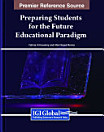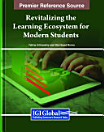Promoting Crisis Management and Creative Problem-Solving Skills in Educational Leadership
About this ebook
By focusing on crisis management, innovative problem-solving strategies, and the development of essential leadership competencies, this book fills the void in the current literature. It not only provides insights into the distinctive challenges of the post-pandemic world but also offers practical guidance and actionable recommendations for leaders in educational settings. Scholars, policymakers, researchers, and practitioners who engage with this book will gain valuable knowledge and tools to navigate the complexities of educational leadership, ensuring the continuous growth and enhancement of their institutions.
About the author
Uzoechi Nwagbara is a professor of management at ICT University. He has BA and MA in English as well as MSc and PhD in Human Resource Management and Management respectively from University of Wales, and MEd in Higher Education as well as PG Cert in Academic Practice from University of Sunderland, UK. He is a Fellow of the Higher Education Academy (FHEA); Member Chartered Management Institute (MCMI); Member Institute of Leadership & Management (MInstLM); and Member Community Development Exchange (MCDE); and also affiliated with British Academy of Management (BAM), European Association for the Study of Literature, Culture and the Environment (EASLCE), Postcolonial Studies Association (PSA) and Royal African Society (RAS). Dr Nwagbara has over 35 years of teaching experience and has taught in higher education for upwards of 25 years. He is external examiner for University of Cumbria and University of Bolton. He has supervised over a dozen doctoral students to completion and published well over 100 publications in high impact journals in management, leadership, CSR, sustainability, employment relations and human resource management. Dr Nwagbara has examined PhD students internally and exterannly in various universities including University of Bedfordshire, Cardiff Metropolitan University, and University of the West of Scotland amongst others. He holds Visiting Teaching Positions at University of Sunderland in London, Coventry University London, London School of Commerce, University of the West of Scotland, The University of Law UK, University of Worcester, University of Wales Trinity Saint David, and University of Plymouth as well as Visiting Professorship (management) Coal City University. He is on the editorial boads of many peer-reviwed, international journals including Economic Insights – Trends & Challenges, Journal of Pan African Studies and Journal of Sustainable Development in Africa.
Yahaya Alhassan is a Principal Lecturer in Finance and Strategic Management at the University of Sunderland in London. He is also the Head of Academic Operations responsible for quality assurance and new programme development. Dr Alhassan holds PhD in Business Management from Anglia Ruskin University, as well as an MBA in Finance from the University of Sunderland. He is also a Senior Fellow of the Higher Education Academy (HEA). He has over 20 years of teaching and management experience developed during roles in the higher education sector and the consultancy industry. Dr Alhassan is a researcher, author, finance and strategic management lecturer, and consultant, and has published over seventeen publications including books, book reviews, journal articles, and book chapters. He has served as a reviewer for highly ranked academic journals, conferences, and edited books for Springer and IGI Publishing. Some of Dr Alhassan’s publications have appeared in the UK ABS 3*** rated Journals. Dr Alhassan regularly presents papers at conferences and has presented over ten papers at various conferences since 2019. His main research interests are development finance, microfinance, entrepreneurial finance, ethnic minority entrepreneurship, and microbusiness development. His current research interests focus on the nexus between financial technology and sustainable entrepreneurship, investment in artificial intelligence, and firm growth. He has also provided consultancy services to organisations nationally and internationally that positively influenced policies, and practices, and reached audiences beyond academia. [Editor]






